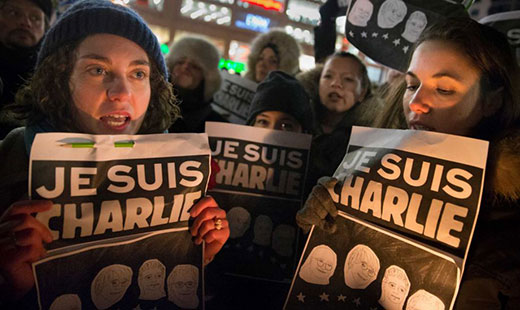
The attack on the French satirical magazine Charlie Hebdo on Jan. 7 cannot be condoned. The persons responsible must suffer the full consequences for their actions.
The attack came at 11 a.m. during an editorial staff meeting, and was carried out by three persons using assault rifles. Killed were Charlie Hebdo’s editor, Stéphan Charbonniere, several members of the staff and two police officers (one of them a Muslim) assigned to the magazine’s premises, which had been the target of threats, and at least one attack, before. A number of other people were injured. The attackers fled in a hijacked car, but later one turned himself in and the other two are said to be hiding in a forested area in the North of the country.
The full motives for the attack are as yet unclear, as is the question of organizational responsibility. Witnesses claimed that the attackers mentioned an affiliation with Al Qaeda in Yemen, but this has not been confirmed. If there was a larger terrorist organization behind the attack, it did not do a very good job of training its bloodthirsty minions: At first, they burst into a building which turned out to be the wrong address; then one of them left his ID card behind in the abandoned getaway car. All three assailants have been identified as French citizens of Algerian extraction from very poor immigrant communities.
Charlie Hebdo (Charlie Weekly) is an irreverent satirical magazine which has attacked and ridiculed everybody and everything, including the Prophet Mohammed, the Koran, the Roman Catholic Church, Orthodox Judaism, political leaders and a wide range of other targets. Its cartoons often would appear obscene to some.
It is within the anti-clerical tradition of the French left, but is also applauded by the anti-Muslim and anti-immigrant right because of its attacks on Muslim targets. The last item Charlie Hebdo sent out on its Twitter account before the attack was a tongue in cheek holiday greeting purported to be from Abu Bakr al Baghdadi, the head of the bloodthirsty Islamic State in Iraq and the Levant organization which has been tearing a swath through Iraq and Syria with thousands of casualties. The tweet shows al Baghdadi wishing everybody “above all, good health.”
The attack on Charlie Hebdo elicited an indignant response clean across the political spectrum. The French Communist Party issued a message denouncing the attack: “This morning the terrorists tried to shut the mouth world of carcicaturists, humorists, of those who are in love with like.” But the French CP also warned against any backlash against France’s approximately 4.7 million citizens and residents (about seven percent of the population) who are either practicing Muslims or of Muslim background, calling on the French people to “reject all the appeals to hatred and racism.”
Muslim organizations in France were no less emphatic in denouncing the attack, and organized a large sympathy rally in front of the magazine’s offices.
Many governments of Muslim majority countries sent messages of sympathy to the French government, including those of Algeria, Azerbaijan, Egypt, Indonesia, Iran, Iraqi Kurdistan, Kazakhstan, Malaysia, Morocco, Pakistan, Syria, and Turkey.
Messages of sympathy came from other countries which do not always see eye to eye. President Obama observed, in part, “Time and time again, the French people have stood up for the universal values that generations of our people have defended.” President Nicolas Madero of Venezuela tweeted, “The government and people of Venezuela repudiate the terrorist attack against France, and we stand by them with all our solidarity and love.”
However, there was a predictable response from another quarter of French public opinion, namely the surging anti-Muslim, anti-immigrant far right. Marine LePen, whose proto-fascist National Front won 25 percent of the French vote in last year’s elections to the European Parliament, looked positively radiant as she issued a call for a return to the death penalty in France.
An explosive mixture has been created in France. Dismal slum communities are full of frustrated and angry young Muslims whose parents came from former French colonies either as refugees or labor migrants, and who suffer from discrimination and police abuse. On the other, you have the growth of a chauvinistic and reactionary nationalism like that of Ms. LePen which scapegoats immigrants and foreigners for the whole country’s economic and social problems.
Former President Sarkozy did less than nothing to calm the situation, and in fact contributed to polarization by his own anti-immigrant demagogy. The current government of the so called “Socialist Party”, headed by President Francois Hollande, has done little to deal with the situation other than to make concessions to the right. His prime minister, Manuel Valls, has been all too eager to push the “national pride” button of French public opinion, in attacks also on the Roma (Gypsy) migrants in France.
France, like the U.S. , has played a dubious role in Muslim countries, with policies that tend to strengthen Islamic extremism, such as the effort to overthrow the government of Syria which has contributed to the growth of violent movements which threaten Syria, Iraq, and beyond.
Photo: AP

MOST POPULAR TODAY

High Court essentially bans demonstrations, freedom of assembly in Deep South

UN warns that Israel is still blocking humanitarian aid to Gaza

Resource wars rage in eastern Congo, but U.S. capitalism only sees investment opportunity

U.S. imperialism’s ‘ironclad’ support for Israel increases fascist danger at home







Comments